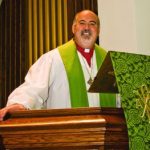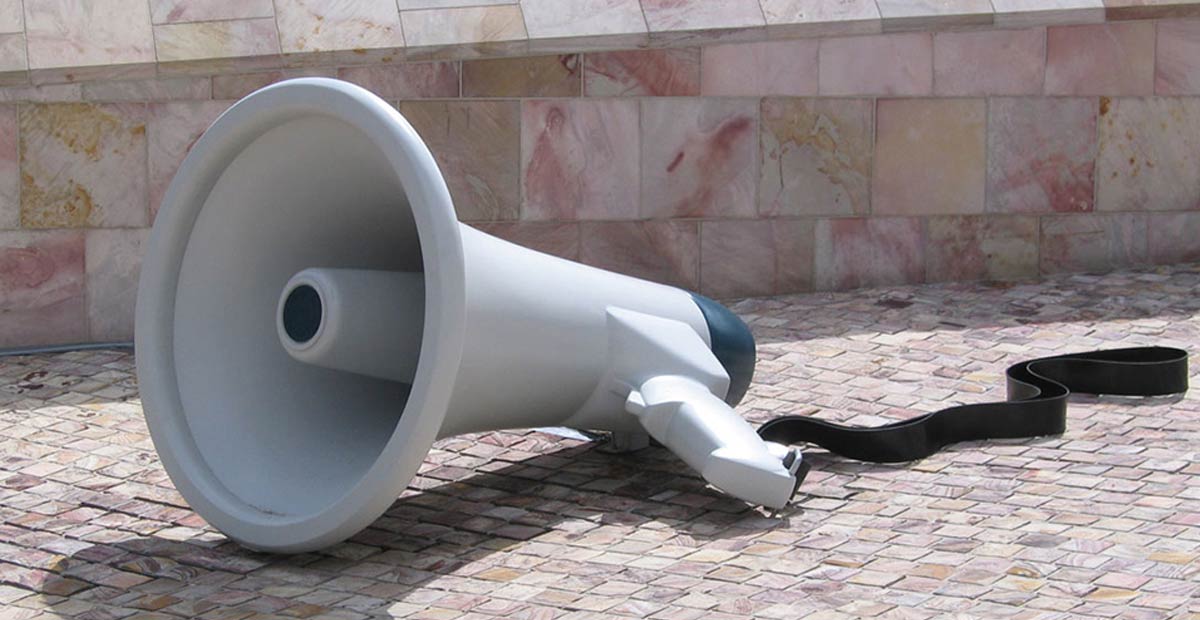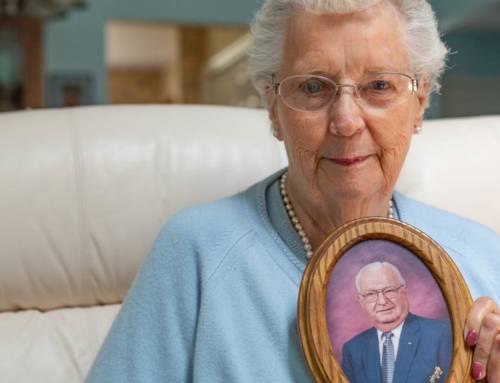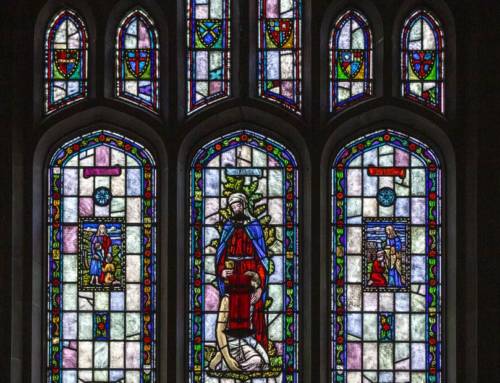
About the Author: Sunday Sermons from Sell Chapel are written by Rev. Preston Van Deursen, Director of Pastoral Care at the Masonic Village at Elizabethtown.
We all know that, don’t we? Actions always speak louder than words.
Chuck Swindoll tells about a three-year-old boy who had been learning the game of golf by watching his grandfather play. “The boy was so enthused,’ said his Grandpa, “I bought him his own set of clubs.” The following week the entire family had a cookout and the little boy who had learned to golf by watching Grandpa announced, “Watch me play golf!” and then he said a no-no word and threw his golf club into the pear tree!
That little fellow had learned about more than golf. And he did it by simply observing his granddad.
St. Paul praised the Christians at Thessalonica for being “an example to all that believe in Macedonia and Achaia.” The people at Thessalonica had been worshipers of idols, but now they were imitators of Christ. And they made this transition in the middle of much tribulation. There was nothing phony in their witness; they were the real thing. And everyone who heard their story was compelled by it. That’s what we need today. People who are willing to be examples. People willing to surrender their own pleasure and desires to the greater good. People who understand that the world needs role models. An unknown author has described our world like this:
“We have taller buildings, but shorter tempers; wider freeways, but narrower viewpoints. We spend more, but have less. We buy more, but enjoy it less. We have bigger houses and smaller families; more conveniences, but less time. We have more degrees, but less sense; more knowledge, but less judgement; more experts, but more problems; more medicine, but less wellness.
“We have multiplied our possessions, but reduced our values. We talk too much, love too seldom, and hate too often. We’ve learned how to make a living, but not a life. We’ve added years to life, not life to years.
“We’ve been all the way to the moon and back, but have trouble crossing the street to meet the new neighbor. We’ve conquered outer space, but not inner space. We’ve cleaned up the air, but polluted the soul. We’ve split the atom, but not our prejudice.
“We have higher incomes, but lower morals. We’ve become long on quantity, but short on quality. These are the times of tall men and short character; steep profits and shallow relationships. These are the times of world peace; but domestic warfare; more leisure, but less fun; more kinds of food, but less nutrition. These are the days of two incomes, but more divorce; of fancier houses, but broken homes. It is a time when there is much in the show window and nothing in the stockroom.” (2)
Whoever that writer is, he or she has described us well. Has a generation ever needed role models more than this one? Has there ever been a generation more in need of people who will set an example?
One of the most familiar faces on television belongs to Dave Thomas, the founder of the Wendy’s hamburger chain. When Dave Thomas was just fifteen, he dropped out of school and moved out on his own. He got a full-time job in the restaurant business, and eventually created the great success that is Wendy’s. But in spite of all his success, Dave has never gotten over his regret of dropping out of school. And he never felt comfortable when people pointed to him as a successful drop-out. He didn’t want to encourage kids today to follow his example.
So Dave decided to get his high school diploma. In 1992, he hired a tutor and began studying for his GED, the equivalency exam that would grant him a high school diploma. It was hard work, but eventually Dave took the test and passed. Now he had a high-school diploma. Someone at Coconut Creek High School in Florida heard of Dave’s effort, and so the student body decided to adopt him. They invited Dave and his wife, Lorraine, to their prom, where they crowned them King and Queen of the event. The students and faculty wanted to honor Dave for going back and taking care of business.
I believe most of us can admire that in Dave Thomas. He didn’t want to encourage young people to follow his example and drop out of school, so when other men were retiring, Dave was going back to high school. I wish everyone had that level of concern for the example they are setting for our young.
There was an article in the news sometime back about a New York Assemblywoman who pleaded to driving while alcohol-impaired. Nothing unusual about that, unfortunately. What was sad was that she is the chair of the Assembly’s Alcohol and Drug Abuse committee.
Do people not care about the impact they have on others anymore? Are we so self-centered as a people that we no longer have any concern about the greater good?
There was another article in the papers about a member of the Labor Party in Great Britain, a Member of Parliament, who was addressing a conference about the environmental damage caused by cars. He railed that “the way we travel is damaging our towns, harming our countryside and already changing the climate of the planet.”
What he said was fine and good until someone pointed out that this allegedly environmentally-concerned politician railing at the damage cars do had arrived at the meeting in a stretch limousine.
Do they think people are dumb? Does no one have any shame anymore? We need heroes. People who stand tall. People who don’t say one thing and do another. People who believe that it is their God-given duty to set a worthy example for others.
Once there was such a woman–a woman by the name of Dranafice. Dranafice, also known as Rose, was a poor woman who lived many years ago in Albania. Rose and her husband opened their home to the poor and hungry in their town. Whenever one of Rose’s daughters would ask who the new visitor at their dinner table was, Rose would answer that it was a relative. Rose’s daughters grew up believing that they came from an enormous extended family.
Even after Rose’s husband died, and the family was plunged into poverty, Rose found a way to give food to the hungry and help to the destitute. One of Rose’s daughters was greatly influenced by her mother’s example of sacrificial love. And now, as Paul Harvey would say, for the rest of the story: This daughter, Agnes, grew up to become an advocate for the poor all over the world. She devoted her whole life to caring for those in need. For young Agnes grew up to become Mother Teresa, the twentieth century’s living example of Christ in the world.
Mother Teresa became who she was because of the example of her mother. Examples matter. The best hope that the world has is that God will raise up people who understand that our lives are intertwined–that who I am and what I do affects who you are and what you do. I can look at my life and see that I am who I am because of the example of significant persons in my life. And the same is true of you. This is how most people become followers of Christ. It is not because someone argued them into the kingdom but because someone loved them into the kingdom and set an example of Christ-like living.
Some of you are familiar with Paul and Margaret Brand, medical doctors in India. India has more than three million people with leprosy, and Dr. Paul Brand was the first orthopedic surgeon to treat them. Dr. Margaret Brand is an ophthalmologist.
The Brands had one patient named Sadan who looked like “a miniature version of Gandhi.” Sadan understood what rejection as a leper was. He was made fun of, kicked, and even turned away from hospitals. Sadan said, “I can still remember when Dr. Brand took my infected, ulcerated feet in his hands. . . . Dr. Brand and his wife were the first medical workers who dared to touch me.”
Sadan had undergone numerous operations including “tendon transfers, nerve stripping, toe amputations, and cataract removal.” Despite his suffering, here is how Sadan, a man who suffers from leprosy characterized his life: “I must say that I am now happy that I had this disease. Apart from leprosy, I would have been a normal man with a normal family, chasing wealth and a higher position in society. I would never have known such wonderful people as Dr. Paul and Dr. Margaret, and I would never have known the God who lives in them.”
That is how people come to Christ–they encounter Christ in those who follow him. That is why Paul was praising the Christians at Thessalonica. This is how children grow into responsible adults. This is how people come to faith in the living Christ. It is by those who care enough to sacrifice their own selfish desires to live a life that contributes to the greater good. It is by those who care enough to set an example of love, of joy, of hope, of courage.
There is a story in one of the CHICKEN SOUP FOR THE SOUL books told by a mother in Costa Mesa, California. It was a hectic day in their home, she says, but with 10 children and one on the way, every day was a bit hectic. On this particular day, however, this mother was having trouble doing even routine chores–all because of one of her little boys.
Len, who was three at the time, was on her heels no matter where she went. Whenever she stopped to do something and turned back around, she would trip over him. Several times, she patiently suggested fun activities to keep Len occupied. “Wouldn’t you like to play on the swing set?” she asked again.
But he simply smiled an innocent smile and said, “Oh, that’s all right, Mommy. I’d rather be in here with you.” Then he continued to bounce happily along behind her.
After stepping on his toes for the fifth time, Len’s Mom began to lose her patience and insisted that he go outside and play with the other children. When she asked him why he was acting this way, he looked up at her with sweet green eyes and said, “Well, Mommy, in Primary my teacher told me to walk in Jesus’ footsteps. But I can’t see
[Jesus], so I’m walking in yours.” (6)
And that’s what it is all about, isn’t it? Role models still count. Worthy examples still make a difference. Perhaps, if the Christians at Thessalonica two thousand years ago had not been faithful under immense hardship–setting examples of sacrificial love for their neighbors–you and I would not be Christians right here in this sanctuary at Sell Chapel.
So here is a question to take home with you today. Are you willing to stand tall for Christ? Are you willing to set an example for those around you?




